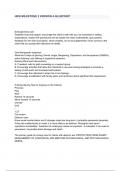HESI
MILESTONE
2
VERSION
A
BLUEPRINT
Schizophrenia
care-
Establish
trust
and
rapport,
encourage
the
client
to
talk
with
you,
be
consistent
in
setting
expectations,
explain
the
procedures
and
be
certain
the
client
understands,
give
positive
feedback
for
the
client
successes,
show
empathy,
do
not
be
judgemental,
never
convey
to
the
client
that
you
accept
their
delusions
as
reality.
Grief
therapeutic
response-
Allow
the
5
steps
of
grieving:
Denial,
Anger,
Bargaining,
Depression,
and
Acceptance
(DABDA),
active
listening,
and
offering
a
supportive
presence.
Nursing
Plans
and
Interventions:
A.
If
needed,
refer
to
grief
counseling
or
a
support
group.
B.
Encourage
activities
that
allow
the
individual
to
use
past
coping
strategies
to
promote
a
feeling
of
self-worth
and
increased
self-esteem.
C.
Encourage
the
individual
to
share
his
or
her
feelings.
D.
Encourage
socialization
with
family
peers
and
reminisce
about
significant
life
experiences.
5
Sanity-Saving
Tips
for
Arguing
on
the
Internet
Previous
Play
Next
Rewind
10
seconds
Move
forward
10
seconds
Unmute
0:05
/
1:27
Full
screen
Delirium
care-
Know
usual
mental
status
and
if
changes
noted
are
long-term,
it
probably
represents
dementia;
if
they
are
sudden/acute
in
onset,
it
is
more
likely
to
be
delirium.
Recognize
and
report
symptoms
immediately.
Treatment
of
underlying
causes
is
important
-
if
untreated,
it
can
lead
to
permanent,
irreversible
brain
damage
and
death.
The
primary
goals
of
nursing
care
for
clients
with
delirium
are:
PROTECTION
FROM
INJURY,
MANAGEMENT
OF
CONFUSION,
AND
MEETING
PHYSIOLOGICAL
AND
PSYCHOLOGICAL
NEEDS. Ensure
patient
safety
(fall
risk)
and
manage
behavioral
problems.
Alert
the
prescriber
of
nonessential
medications.
Nutritional
and
fluid
intake
must
be
monitored.
A
quiet
and
calm
environment.
Encourage
visitors
to
touch
and
talk
to
patients.
Assess/manage
pain.
Alzheimer's
hallucination-
Occurs
in
the
late-middle
to
later
stages
of
the
disease
process
and
is
treated
with
antipsychotics
such
as
Haldol
Alcohol
withdrawal-
Symptoms
of
withdrawal
usually
begin
4
to
12
hours
after
cessation
or
marked
reduction
of
alcohol
intake.
Symptoms
include
coarse
hand
tremors,
sweating,
elevated
pulse,
and
blood
pressure,
insomnia,
anxiety,
and
nausea
or
vomiting.
Severe
or
untreated
withdrawal
may
progress
to
transient
hallucinations,
seizures,
or
delirium,
called
delirium
tremors.
Alcohol
withdrawal
usually
peaks
on
the
second
day
and
is
over
in
about
5
days.
This
can
vary,
however,
and
withdrawal
may
take
1
to
2
weeks.
Safe
withdrawal
is
usually
accomplished
with
the
administration
of
benzodiazepines,
such
as
lorazepam
(Ativan),
chlordiazepoxide
(Librium),
or
diazepam
(Valium),
to
suppress
the
withdrawal
symptoms.
Nursing
Plans
and
Interventions
A.
Maintain
safety,
nutrition,
hygiene,
and
rest.
B.
Obtain
a
BAL
on
admission
or
when
a
client
appears
intoxicated
after
admission.
C.
Implement
suicide
precautions
if
assessment
indicates
risk.
D.
In
general
1.
Monitor
vital
signs,
input
and
output
(I&O),
and
electrolytes.
2.
Observe
for
impending
DTs. 3.
Prevent
aspiration;
implement
seizure
precautions.
4.
Reduce
environmental
stimuli.
5.
Medicate
with
antianxiety
medication,
usually
chlordiazepoxide
(Librium)
or
lorazepam
(Ativan)
6.
Provide
high-protein
diet
and
adequate
fluid
intake
(limit
caffeine).
7.
Provide
vitamin
supplements,
especially
vitamins
B1
and
B
complex.
8.
Provide
emotional
support.
Methadone-
Detoxification
and
maintenance
therapy
for
opioid
use
disorder.
Suppression
of
withdrawal
symptoms
during
detox
related
to
opioids
such
as
heroin.
It
can
cause
respiratory
depression.
Do
not
give
it
to
patients
with
acute
or
severe
bronchial
asthma.
It
is
contraindicated
for
patients
taking
MAOIs.
Methadone
Overdose:
A).
Physical
Assessment
-Constricted
pupils
-
Respiratory
depression
leading
to
respiratory
arrest
-Circulatory
depression
leading
to
cardiac
arrest
-Unconsciousness
leading
to
coma
-Death
B).
General
Appearance
-General
physical
and
mental
deterioration -Rapid
tolerance-overdose
likely
if
not
monitored.
-Impaired
judgment
Aggression
response-
The
nurse
must
protect
others
from
these
clients'
manipulative
or
aggressive
behaviors.
At
the
beginning
of
treatment,
he
or
she
must
set
limits
on
unacceptable
behavior.
The
limit
setting
involves
the
following
three
steps:
Inform
clients
of
the
rule
or
limits.
Explain
the
consequences
if
clients
exceed
the
limit.
State
expected
behavior.
Nursing
Plans
and
Interventions:
Conduct
and
Defiant
Disorders
A.
Assess
verbal
and
nonverbal
cues
for
escalating
behavior
so
as
to
decrease
outbursts.
B.
Use
a
nonauthoritarian
approach.
C.
Avoid
asking
"why"
questions.
D.
Initiate
a
"show
of
force"
with
a
child
who
is
out
of
control.
E.
Use
a
"quiet
room"
when
external
control
is
needed.
F.
Clarify
expressions
or
jargon
if
meanings
are
unclear.
G.
Teach
to
redirect
angry
feelings
to
safe
alternative,
such
as
a
pillow
or
punching
bag.
H.
Implement
behavior
modification
therapy
if
indicated.
I.
Role-play
new
coping
strategies
with
client.
Duty
to
warn-
The
obligation
of
a
healthcare
provider
to
warn
third
parties
of
potential
threats
or
harm
aimed
at
them
by
another
individual.




